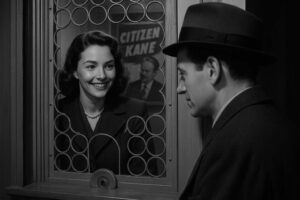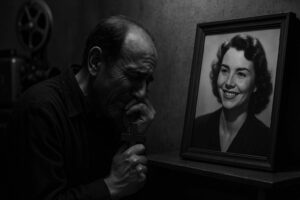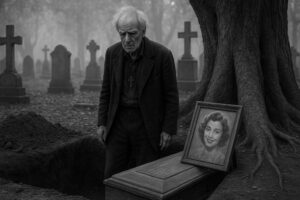My mother had seen Mashhadi Mohammad — known as Mashhadi Fred Astaire — dance a tap routine on stage that even Fred Astaire himself couldn’t match. God knows when it was — perhaps back when my mother was young, lively, and fond of going to the movies, in the heyday of the musical talkies. Mashhadi was a distant relative of my mother’s who had spent his youth serving American and British soldiers during the Second World War, learning their language and becoming their interpreter. In those same years, Mashhadi became a “dilmāch” — a live translator of films for the public. In the small cinemas of the time, he would point to the titles on the screen with his cane and read aloud his free Persian translation to the audience.
I first met Mashhadi when he was sixty, bedridden with tuberculosis and about to be taken from home to the hospital. I brought him meat pastries — which I knew he loved — and that week’s issue of Time magazine. My mother couldn’t come with me; her rheumatism kept her from walking, but she sent him many greetings and a few shared memories.
When I asked about the past, he said, “It was Orson Welles who ruined my life. I was a simple country boy, proud to serve soldiers with delicious chocolate bars in their packs. Then one summer night, under the starlight, they screened Citizen Kane, and my fate changed forever. I became a slave to that silver screen. A spell fell upon me, leaving me enchanted and lost in the stories of the people on it.”
When the film ended, and the lights came up in the projection tent and the soldiers left, I was still sitting there, transfixed — until the voice of that green-eyed, mischievous Armenian — a sorcerer who breathed life into the ghosts of the silver screen — brought me back to earth. Yes, I first met Misha with Citizen Kane. He had come from Baku, disillusioned with the Red Army, and had become a projectionist for the Americans. Misha was a strange creature — a reciter of Shahnameh, a scholar of Rumi, and even a mourner during Muharram with a beautiful voice. Misha was addicted to film; he touched the 35mm reels with love, kept the projection booth as a shrine, and would not allow anyone to enter with shoes on.

That night, seeing my bewilderment at my first encounter with cinema, he sat me in a seat near the screen and showed Citizen Kane again. He said, “This is the only gem in this trash heap — the rest are junk fit for dim-witted American soldiers.” Overnight, we became friends of a hundred years, and the cinema tent became my hangout. I, born in a village near Neyshabur, suddenly found my holy place in cinema and my spiritual guide in a fat cigar-smoking infidel named Orson Welles.
Then came a bitter day. A young man had attacked the American base; bound and beaten, he was to be tried. He claimed American soldiers had assaulted his wife, and he didn’t care what happened to him. He spat in my face, thinking me a traitor — which perhaps I was. I argued with the American sergeant who was judge and prosecutor in one, when suddenly an explosion shattered everything. The cinema tent was on fire. I ran toward it, but it was too late to save Misha. The fire was so fierce that when it died, only a mound of ashes remained. Perhaps Misha had gone to heaven through the hell made by burning film.
Mashhadi began to cough violently, and I gave him a glass of water. His tired face lit up with the joy of remembering better days.
I had known Misha too. When I was twelve, he was the soul of our neighborhood’s small cinema — helping at the ticket booth, running the snack bar, and projecting the films. During Muharram, on Tasua and Ashura, he would hang a black flag above the cinema and chant elegies from loudspeakers in the street — so mesmerizing that no one cared the owner of that heavenly voice carrying all the sorrows of the world was Armenian. Processions would beat their chests to Misha’s lamentations, and he, dressed in black, would march alongside them.
Misha was utterly alone. Locals said his wife had died in childbirth years before, and the child had been stillborn. He loved all children. When I saw Duel in the Sun twenty-five times and cried each time with Jennifer Jones over Gregory Peck’s death, Misha saw my love for cinema and let me sell sandwiches at the cinema after school. At closing time, I’d tidy the snack bar and go home — but I often heard his quiet voice in the projection booth, singing a mournful Armenian song, perhaps even weeping. One night, curiosity drew me to the booth. I burst in to find him before a photograph of a curly-haired woman who bore a striking resemblance to Jennifer Jones.
This Jennifer Jones in the photo was Misha’s Anahit — beautiful, dignified, and loving. They had met in Isfahan’s Jolfa district, and their first kiss was born on a May night beside the Zayandeh River.
Misha said that after Anahit’s passing, Mashhadi Mohammad never left his side. They worked in the same cinema — Misha as eternal projectionist, Mashhadi as translator and curtain-raiser. Misha was not always sad; with children, he became one himself. After showing Dracula for the first time, he spread the rumor that he was a vampire. The kids would show up with garlic and crosses, and Misha would chase them, “accidentally” dropping ten-shahi coins that the children scrambled to collect. Misha, his games, and his coins were beloved.
Mashhadi said he was so angry at the Americans’ indifference to Misha’s death that one morning he deserted the base, joined five acrobat brothers performing in Lalehzar, and went from interpreter to acrobat to curtain-raiser. But his heart stayed with cinema, and the taste of Citizen Kane lingered. Everything he earned went to watching films — until one strange night outside a cinema, someone covered his eyes and asked in English to guess who. The voice was so like Orson Welles’s that his heart almost stopped. Could it be Misha?
It was — and so began a whole second life of encounters, loves, films, and tragedies, until the bitter end: a winter’s night when Anahit and her unborn child both died. And from there… the story wove through graves, lost reels of film, the Polish section of Doulab Cemetery, years of wandering, strange reunions, the shadow of Vertigo over everything, until the final scene: Mashhadi and Misha dancing together one last time in the hospital, laughter chasing away sorrow, until Mashhadi fell into a peaceful, never-ending sleep. And Misha walked away into the night, never to be found again.
That night when Misha and I found each other again, it seemed stripped of any magic. Misha looked younger, and there was the spell of Humphrey Bogart in his gaze and smile. That very night, he told me what had happened to him — and about his great love.
“The anger I felt after setting fire to the Americans’ film tent, my revenge for their treacheries, was eased. With the *Citizen Kane* reels stuffed in a sack, I wandered the streets, drifting from one cinema to another, until I came to a small movie house on a side street. Its old projectionist had vanished due to memory loss. The owner, Anastasia — a kind, lively Russian woman — had put up for a year with the audience’s grumbling over films being shown out of sequence. She had kept the projectionist on, but when she’d searched everywhere and couldn’t find him, I was like a gift from heaven. I missed you too, but each time I went near the barracks, I couldn’t find you — until tonight at the theater, where I saw you with the acrobats.”
When we reached the cinema, I saw an extraordinarily beautiful woman behind the ticket booth. She was Anahit, Misha’s wife.

“You won’t believe how I met her,” Misha said. “Every so often, Anastasia would go to the Polish camp and bring Polish women to see a film for the first time. The first time I saw them, I suddenly locked eyes with Anahit. She had the face of Jennifer Jones, and the dignity and deep, sorrowful gaze of Ingrid Bergman. We were both transfixed, and the rest of the world faded away. By coincidence, that day we were showing Casablanca. When the film ended and I saw her again, I felt like Humphrey Bogart about to lose my Ingrid Bergman. I spent the whole night, bitter soda in hand, watching Casablanca four times and weeping.”
The next day brought a wonder: I saw the Polish Jennifer Jones standing in the rain outside the cinema, holding a sack. When I went to her, she handed me the sack and followed me inside. She spoke no Russian, Persian, or Armenian, and I knew no Polish. Inside the sack was a 35mm film reel. She pointed to the screen and gave me a smile that destroyed me, saying, “Ana.” My voice barely came out: “Misha.”
When I ran the reel through the projector, there she was — the magical Ana, on the screen. She too belonged to the boundless land of cinema, my fellow countrywoman in spirit. Clearly, she had no intention of returning to the camp; she had sought refuge with me and the cinema, and with a gesture asked to live in the projection booth.
God knows how many times we watched that reel together. Later I learned it was a 1939 Polish film called Three Hearts. Ana too was a prisoner of the silver screen’s spell, descended from generations of actors. She knew films by heart, repeating the lines of Casablanca without knowing their meaning. This Polish Jennifer Jones was my Ingrid Bergman. The language of cinema became our shared tongue; we acted out scenes to speak to each other, and Ana told me of her painful, difficult migration.
When Anastasia learned of our uninvited guest, she said we must either marry immediately or Ana would have to return to the camp. Using her contacts among the Russians who ruled Tehran, she arranged the marriage without us even being there, only agreeing to my request to rename Ana “Anahit,” in memory of my painter grandmother. But Ana wanted a church wedding — and by luck, we had *The Philadelphia Story* in storage. I projected its wedding scene, and in front of the screen Ana and I answered the priest’s questions from the film. He declared us husband and wife. What could be better? For us, Spencer Tracy was Ana’s father, Cary Grant my best man, and Anastasia the mother of us both.
Mashhadi said that Misha and Anahit lived in an eternal happy ending, turning *Casablanca*’s bitter close into a sweet fate.
Encouraged by Anastasia, who loved live curtain-raising acts, I began performing a half-hour comedy before each film. Then Fred Astaire’s tap dances in Broadway Melody and You’ll Never Get Rich bewitched me. As the last tenant of the projection booth, I practiced tap at night in the auditorium. One evening, instead of delivering my usual pre-film patter, I launched into my own improvised tap — a mix of porter’s dance, Baba Karam, and Fred Astaire footwork. The stunned audience applauded for fifteen minutes, and I earned the nickname Mashhadi Fred Astaire.
We had good days in those hard times. Misha and Anahit were expecting their first child and spent their time watching films about births. But every happy ending has its end. One dark, freezing winter night, tragedy struck — both Anahit and her unborn child were lost.
Anastasia and I never left Misha alone. Like a shadow, I followed him to the Polish section of Doulab Cemetery. Anahit, her baby, and the reel of film she starred in lay buried in one grave. Misha stopped speaking to me. Then one day he vanished.
Anastasia, devastated, closed her cinema and sold the building to an Armenian who turned it into a print shop. She got me a job there, and by strange fate, the shop printed the film weekly Hollywood. Within months I became a professional typesetter, moving from shop to shop, but always working on film magazines. I was at Setareh Cinema when I learned that the metal dust from years of typesetting had finally given me tuberculosis.
Now Mashhadi spends his last days in the Niavaran TB hospital. He has accepted his fate, still loving cinema, sometimes offering a brief Fred Astaire shuffle for the other patients, though his coughing cuts him short. His greatest wish is to see Misha. I, who had lost him in my youth, began searching the city — cinema by cinema. After a week, I had visited them all. The last was Kasra Cinema, showing my favorite film of all time, *Vertigo*. Watching it for the 223rd time, Scottie’s search for Madeleine reminded me of Misha’s wandering after Anahit’s death.
The next morning, sleepless, I went to Doulab Cemetery’s Polish section — and there was Misha, very old and withered, happily chasing children who called him “Dracula.” Like Scottie atop the church tower after Madeleine’s fall, he stood staring at nothing until my voice brought him back to life.
Misha told me that after fleeing the cinema, he had wandered the streets for a year, avoiding any place that stirred the pain of losing Anahit. Then he came to my old neighborhood and saw the swarm of kids around the cinema. Suddenly, he knew it was time to stop drifting. As Mashhadi says, children are “the program of the future.” Our shared love for Jennifer Jones made us perhaps eternal friends. But then I left the neighborhood, he was alone, and fear came. Then came that cursed film, that naked dagger of terror — *Vertigo*. I began to see the world through Scottie’s bewitched eyes. In rainy winter nights, I dreamed of Anahit standing in the rain outside the cinema, an empty black bag in her hand, asking for her film reel. It was as if she were cursing me, no longer loving me.
One night I left the cinema, wandering in the rain until I found myself at her grave. I clawed at the rain-soaked earth until I knew nothing. At dawn, I woke inside her grave beside her rotted coffin. Her film reel had decayed, leaving only a few frames — in one of which she still existed.
This became my home. There is an ancient plane tree here, only its trunk left, like the old tree in *Vertigo* whose rings showed the passing centuries as Madeleine told Scottie of her life and death. I watch Anahit’s life and passing upon it, dozens of times each day.
Mashhadi could not believe it was Misha standing before him, saying:
> “Shame on you, Mashhadi Astaire — what are you doing in bed? Get up and give me a tap dance!”
That day and night became a feast. Mashhadi seemed twenty again — talking, laughing, dancing with Misha, playing endless jokes, acting out scenes from famous films. Patients, nurses, doctors, even the guards joined in the celebration until midnight.
Mashhadi coughed violently yet danced like in his youth — something between Baba Karam, porter’s steps, and Fred Astaire’s tap — with Misha matching him. Even when everyone left and only the three of us remained, the sunrise came, and Mashhadi fell into a peaceful sleep from which he never woke — a joyous death.
Misha left in such a way that I knew never to search for him again.
(Dedicated to my dear Parviz Davaei, whom I admire deeply.)








